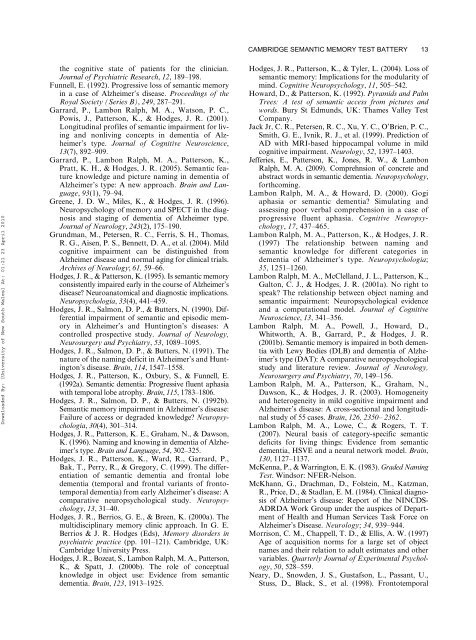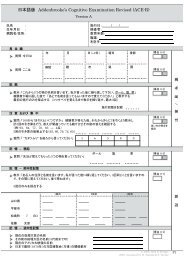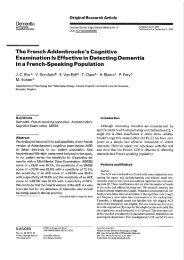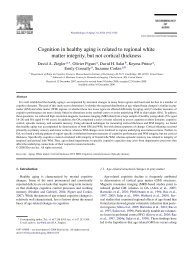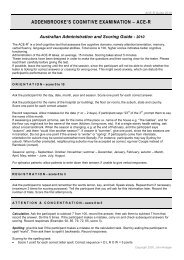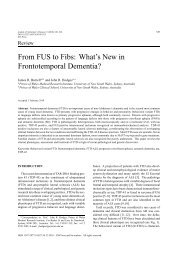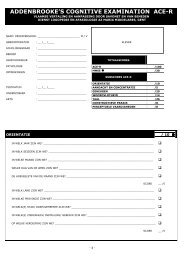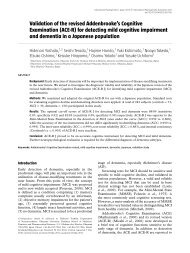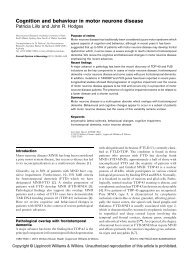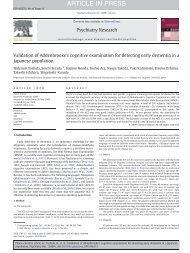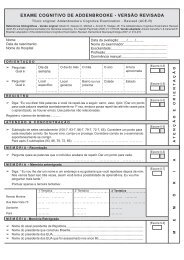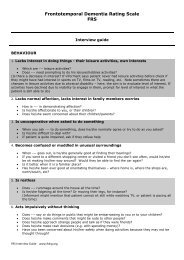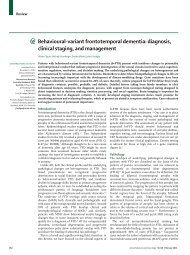Neurocase The Cambridge Semantic Memory Test Battery ...
Neurocase The Cambridge Semantic Memory Test Battery ...
Neurocase The Cambridge Semantic Memory Test Battery ...
Create successful ePaper yourself
Turn your PDF publications into a flip-book with our unique Google optimized e-Paper software.
Downloaded By: [University of New South Wales] At: 01:21 23 April 2010<br />
the cognitive state of patients for the clinician.<br />
Journal of Psychiatric Research, 12, 189–198.<br />
Funnell, E. (1992). Progressive loss of semantic memory<br />
in a case of Alzheimer’s disease. Proceedings of the<br />
Royal Society (Series B), 249, 287–291.<br />
Garrard, P., Lambon Ralph, M. A., Watson, P. C.,<br />
Powis, J., Patterson, K., & Hodges, J. R. (2001).<br />
Longitudinal profiles of semantic impairment for living<br />
and nonliving concepts in dementia of Alzheimer’s<br />
type. Journal of Cognitive Neuroscience,<br />
13(7), 892–909.<br />
Garrard, P., Lambon Ralph, M. A., Patterson, K.,<br />
Pratt, K. H., & Hodges, J. R. (2005). <strong>Semantic</strong> feature<br />
knowledge and picture naming in dementia of<br />
Alzheimer’s type: A new approach. Brain and Language,<br />
93(1), 79–94.<br />
Greene, J. D. W., Miles, K., & Hodges, J. R. (1996).<br />
Neuropsychology of memory and SPECT in the diagnosis<br />
and staging of dementia of Alzheimer type.<br />
Journal of Neurology, 243(2), 175–190.<br />
Grundman, M., Petersen, R. C., Ferris, S. H., Thomas,<br />
R. G., Aisen, P. S., Bennett, D. A., et al. (2004). Mild<br />
cognitive impairment can be distinguished from<br />
Alzheimer disease and normal aging for clinical trials.<br />
Archives of Neurology; 61, 59–66.<br />
Hodges, J. R., & Patterson, K. (1995). Is semantic memory<br />
consistently impaired early in the course of Alzheimer’s<br />
disease? Neuroanatomical and diagnostic implications.<br />
Neuropsychologia, 33(4), 441–459.<br />
Hodges, J. R., Salmon, D. P., & Butters, N. (1990). Differential<br />
impairment of semantic and episodic memory<br />
in Alzheimer’s and Huntington’s diseases: A<br />
controlled prospective study. Journal of Neurology,<br />
Neurosurgery and Psychiatry, 53, 1089–1095.<br />
Hodges, J. R., Salmon, D. P., & Butters, N. (1991). <strong>The</strong><br />
nature of the naming deficit in Alzheimer’s and Huntington’s<br />
disease. Brain, 114, 1547–1558.<br />
Hodges, J. R., Patterson, K., Oxbury, S., & Funnell, E.<br />
(1992a). <strong>Semantic</strong> dementia: Progressive fluent aphasia<br />
with temporal lobe atrophy. Brain, 115, 1783–1806.<br />
Hodges, J. R., Salmon, D. P., & Butters, N. (1992b).<br />
<strong>Semantic</strong> memory impairment in Alzheimer’s disease:<br />
Failure of access or degraded knowledge? Neuropsychologia,<br />
30(4), 301–314.<br />
Hodges, J. R., Patterson, K. E., Graham, N., & Dawson,<br />
K. (1996). Naming and knowing in dementia of Alzheimer’s<br />
type. Brain and Language, 54, 302–325.<br />
Hodges, J. R., Patterson, K., Ward, R., Garrard, P.,<br />
Bak, T., Perry, R., & Gregory, C. (1999). <strong>The</strong> differentiation<br />
of semantic dementia and frontal lobe<br />
dementia (temporal and frontal variants of frontotemporal<br />
dementia) from early Alzheimer’s disease: A<br />
comparative neuropsychological study. Neuropsychology,<br />
13, 31–40.<br />
Hodges, J. R., Berrios, G. E., & Breen, K. (2000a). <strong>The</strong><br />
multidisciplinary memory clinic approach. In G. E.<br />
Berrios & J. R. Hodges (Eds), <strong>Memory</strong> disorders in<br />
psychiatric practice (pp. 101–121). <strong>Cambridge</strong>, UK:<br />
<strong>Cambridge</strong> University Press.<br />
Hodges, J. R., Bozeat, S., Lambon Ralph, M. A., Patterson,<br />
K., & Spatt, J. (2000b). <strong>The</strong> role of conceptual<br />
knowledge in object use: Evidence from semantic<br />
dementia. Brain, 123, 1913–1925.<br />
CAMBRIDGE SEMANTIC MEMORY TEST BATTERY 13<br />
Hodges, J. R., Patterson, K., & Tyler, L. (2004). Loss of<br />
semantic memory: Implications for the modularity of<br />
mind. Cognitive Neuropsychology, 11, 505–542.<br />
Howard, D., & Patterson, K. (1992). Pyramids and Palm<br />
Trees: A test of semantic access from pictures and<br />
words. Bury St Edmunds, UK: Thames Valley <strong>Test</strong><br />
Company.<br />
Jack Jr, C. R., Petersen, R. C., Xu, Y. C., O’Brien, P. C.,<br />
Smith, G. E., Ivnik, R. J., et al. (1999). Prediction of<br />
AD with MRI-based hippocampal volume in mild<br />
cognitive impairment. Neurology, 52, 1397–1403.<br />
Jefferies, E., Patterson, K., Jones, R. W., & Lambon<br />
Ralph, M. A. (2009). Comprehnsion of concrete and<br />
abstract words in semantic dementia. Neuropsychology,<br />
forthcoming.<br />
Lambon Ralph, M. A., & Howard, D. (2000). Gogi<br />
aphasia or semantic dementia? Simulating and<br />
assessing poor verbal comprehension in a case of<br />
progressive fluent aphasia. Cognitive Neuropsychology,<br />
17, 437–465.<br />
Lambon Ralph, M. A., Patterson, K., & Hodges, J. R.<br />
(1997) <strong>The</strong> relationship between naming and<br />
semantic knowledge for different categories in<br />
dementia of Alzheimer’s type. Neuropsychologia;<br />
35, 1251–1260.<br />
Lambon Ralph, M. A., McClelland, J. L., Patterson, K.,<br />
Galton, C. J., & Hodges, J. R. (2001a). No right to<br />
speak? <strong>The</strong> relationship between object naming and<br />
semantic impairment: Neuropsychological evidence<br />
and a computational model. Journal of Cognitive<br />
Neuroscience, 13, 341–356.<br />
Lambon Ralph, M. A., Powell, J., Howard, D.,<br />
Whitworth, A. B., Garrard, P., & Hodges, J. R.<br />
(2001b). <strong>Semantic</strong> memory is impaired in both dementia<br />
with Lewy Bodies (DLB) and dementia of Alzheimer’s<br />
type (DAT): A comparative neuropsychological<br />
study and literature review. Journal of Neurology,<br />
Neurosurgery and Psychiatry, 70, 149–156.<br />
Lambon Ralph, M. A., Patterson, K., Graham, N.,<br />
Dawson, K., & Hodges, J. R. (2003). Homogeneity<br />
and heterogeneity in mild cognitive impairment and<br />
Alzheimer’s disease: A cross-sectional and longitudinal<br />
study of 55 cases. Brain, 126, 2350– 2362.<br />
Lambon Ralph, M. A., Lowe, C., & Rogers, T. T.<br />
(2007). Neural basis of category-specific semantic<br />
deficits for living things: Evidence from semantic<br />
dementia, HSVE and a neural network model. Brain,<br />
130, 1127–1137.<br />
McKenna, P., & Warrington, E. K. (1983). Graded Naming<br />
<strong>Test</strong>. Windsor: NFER-Nelson.<br />
McKhann, G., Drachman, D., Folstein, M., Katzman,<br />
R., Price, D., & Stadlan, E. M. (1984). Clinical diagnosis<br />
of Alzheimer’s disease: Report of the NINCDS-<br />
ADRDA Work Group under the auspices of Department<br />
of Health and Human Services Task Force on<br />
Alzheimer’s Disease. Neurology; 34, 939–944.<br />
Morrison, C. M., Chappell, T. D., & Ellis, A. W. (1997)<br />
Age of acquisition norms for a large set of object<br />
names and their relation to adult estimates and other<br />
variables. Quarterly Journal of Experimental Psychology,<br />
50, 528–559.<br />
Neary, D., Snowden, J. S., Gustafson, L., Passant, U.,<br />
Stuss, D., Black, S., et al. (1998). Frontotemporal


